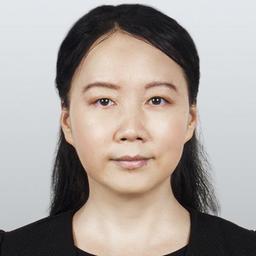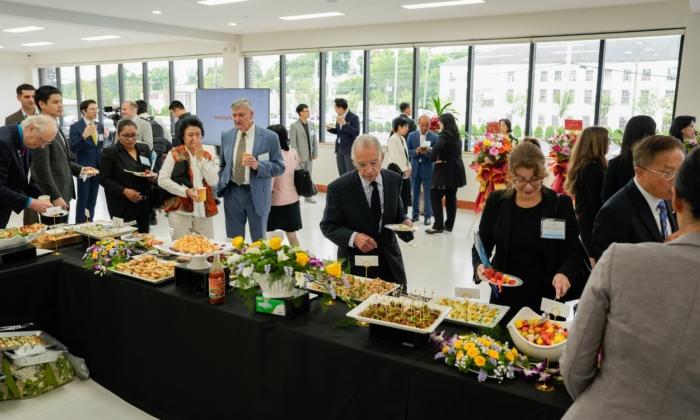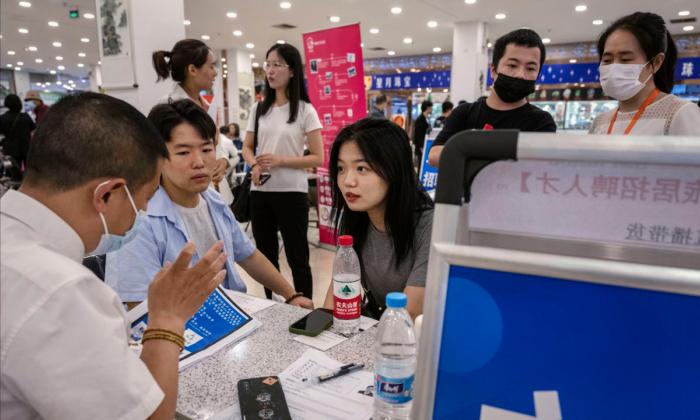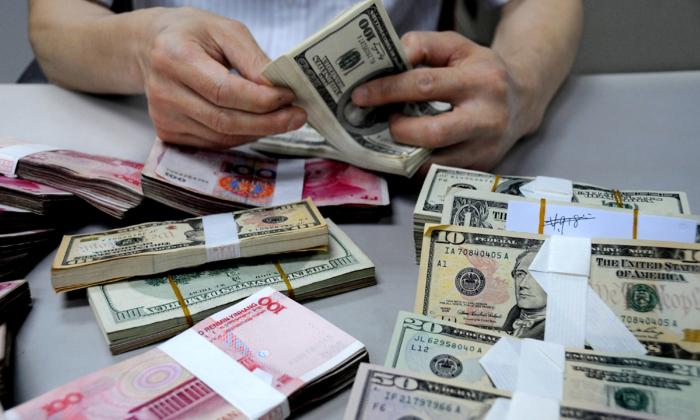Over the past three years, more tech companies around the globe are aligning with U.S. efforts to decouple from China—a campaign to cut China out of the high-tech supply chain started by the Trump administration.
Amid the U.S.-led decoupling endeavor, Taiwan, the world’s largest chip producer and arguably the most critical link in the high-tech supply chain, has become Beijing’s primary target to infiltrate.
‘Four Loopholes’
In an interview with The Epoch Times, Lai Chung-Chiang, a Taiwanese lawyer and convenor of Economic Democracy Union (EDU), a Taiwanese think tank, unveiled four situations that may lead to Taiwan’s key semiconductor manufacturing processes falling into the hands of Beijing.Lai called them “the four loopholes” and urged the Taiwanese government to pay close attention.
The first loophole involves the transfer of shares. China could take control of Taiwanese manufacturing facilities in China by transferring their controlling stake to a Chinese national and taking over the ownership of their key technologies.
The second loophole entails Beijing using foreign capital to invest in Taiwan’s sensitive industries. Chinese-funded enterprises in Hong Kong or abroad could potentially evade scrutiny from Taiwan’s investment commission.
The third vulnerability is China taking advantage of Taiwan’s regulatory loopholes. A past policy issued by Taiwan’s Ministry of Economic Affairs allows for Chinese investment in Taiwanese companies as long as the stake does not exceed 33 percent. Although they don’t have the controlling shares, the Chinese investors could use their position as major shareholders to acquire sensitive information from the Taiwanese companies.
Lai said there had been many past precedents. For instance, in 2012, Luxshare Precision, a Chinese manufacturing company, cleverly kept its stake in Speed Tech Corp., a Taiwanese tech company, at 30.55 percent to avoid a review from Taiwan’s investment commission, which allowed it to acquire sensitive information from the firm.
The fourth loophole is targeting a company’s suppliers instead of the company. Beijing could infiltrate the global semiconductor supply chain by investing in its equipment or materials suppliers.
For example, Taiwan Semiconductor Manufacturing Company (TSMC), the world’s largest contract chipmaker, is exporting at least 26 key suppliers to the United States for its upcoming factory in Arizona.
However, among the equipment suppliers that went to the United States, Hua Yang Precision Machinery, a Taiwanese equipment company, has been substantially invested by a Chinese company, Shenzhen Liande Automation Equipment.
Hua Yang Precision Machinery provides the mask inspection system, a critical component in TSMC’s semiconductor manufacturing process.
The company’s general manager Paul Hsiao told The Epoch Times that they are “continuously pushing the Chinese company to divest in Hua Yang.” He said the Chinese stake has now been reduced to 9 percent and that a complete divestment from China is the company’s ultimate goal.
However, EDU’s lawyer Chen Hsu-Cheng pointed out that Hua Yang Precision Machinery’s chairman Terry Chiu holds more than 466,000 shares in Shenzhen Liande Automation Equipment, which presents a conflict of interest.
EDU called on the Taiwanese authorities to revise relevant laws and regulations as soon as possible to effectively prevent sensitive industries and technologies from being acquired by Chinese investors.
“Taiwan is a key link in the global supply chain restructuring. The security of Taiwan’s high-tech industries determines the success or failure of the U.S.-led efforts to decouple from China,” Hong Kong columnist Liao Shiming told The Epoch Times.
In the past, Beijing used Hong Kong’s special status to import sensitive U.S. products and even military-related tech, Liao said.
US Sanctions Severely Hinder China’s Tech Development
Back in 2015, the Chinese Communist Party (CCP) announced its “Made in China 2025” (MIC 2025) initiative. The goal was to invest heavily in domestic technology development in order to end Chinese dependence on foreign technology and transform China into a global powerhouse of high-tech industries in 10 years.However, the CCP’s quest for semiconductors, in particular, has gone entirely off the rails. In 2016, China imported more chips than oil for the first time. In 2020, its chip imports reached $380 billion. And last year, the imported chip amount exceeded $440 billion, more than China’s oil and soybean imports in 2021 combined, according to China’s General Administration of Customs.
In addition, Liao believes that CCP official figures on imports may be seriously underreported, likely due to chip smuggling. He cited the discrepancies between the import-and-export index numbers released by Hong Kong customs and China customs, with Hong Kong’s number exceeding China’s by over $300 billion in 2021.
Liao explained that there are no import and export tariffs in Hong Kong, so the middlemen do not have to hide the destination of entrepot trades. But Chinese imports of semiconductors are subject to tariffs, so the importers may resort to other means, such as smuggling, to retain profit margins.
For instance, Shenzhen has become the largest market for chip procurement in China in recent years. Many small private businesses in Shenzhen’s Huaqiangbei electronics market have relied on chip trading to achieve super-profits in the past two years, many of which come from Hong Kong.
“However, relying on [chip] smuggling won’t save China’s high-tech industries,” Liao said.
A 7,600-character report published by the school’s Institute of International and Strategic Studies on Jan. 30 also found that China’s losses from a tech decoupling would likely be larger than those of the United States, citing many key reasons, including the bottleneck of China’s high-tech development and chip manufacturing technologies.
China Endeavors to Break Through US Blockade
In July 2021, China’s state-backed Tsinghua Unigroup, once the national champion in semiconductor manufacturing, defaulted on its debts and entered a court-mediated restructure. The conglomerate that once leaped to lead China’s semiconductor industry by engaging in a string of acquisitions is now bankrupt and in need of a bailout.In December, Tsinghua Unigroup announced that a consortium led by Beijing Jianguang Asset Management (JAC Capital) and Wise Road Capital would become strategic investors to bail out the Beijing-based semiconductor developer, according to the Financial Times. The consortium would acquire all its subsidiaries, including China’s largest memory chip maker Yangtze Memory and other major chip design companies.
The two Chinese funds will step up further acquisitions of semiconductor-related companies, setting up a domestic supply chain covering chip design, manufacturing, packaging and testing, and raw materials.
US Strengthens Efforts to Decouple From China
The White House briefing on Feb. 11 introduced an Indo-Pacific economic framework (IPEF) that outlines the U.S.’s key priorities to align with allies and partners in order to compete more effectively with China in a technology race.The strategy addresses China’s much more assertive and aggressive behavior in the Indo-Pacific region and the importance of establishing a high-tech supply chain without China.
According to the Center for China and Globalization, a Chinese think tank, from May 14, 2019, to Apr. 8, 2021, the U.S. Department of Commerce put 336 Chinese entities, including persons, onto its Entity List, restricting their acquisition of sensitive U.S-related technologies. The sanctions list includes Huawei, SMIC, and many critical technology companies such as state-owned supercomputing centers across China.
The U.S.-led decoupling effort continues to grow, with more allies and partners joining the effort. Among them, Taiwan is arguably one of, if not the most, critical player.
In a war of containment and infiltration surrounding high technology, who will come out on top is still not clear.





